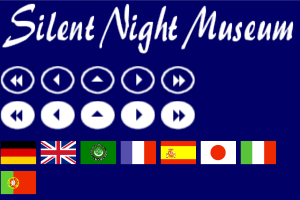Sensation: Silent night! Holy night! Historic correct translationFirst english historic correct translation in the spirit and meaning of Joseph Mohr including all 6 verses.Translated by Bettina Klein© 1998 Silent Night Museum A-5024 Salzburg, Steingasse 9
|
|
Silent Night! Holy Night! All is calm, all is bright Round yon godly tender pair Holy infant with curly hair Sleep in heavenly peace Sleep in heavenly peace. Silent Night! Holy Night! Son of God, love's pure light Radiant beams from thy holy face With the dawn of redeeming grace Jesus, Lord at thy birth Jesus, Lord at thy birth. Silent Night! Holy Night! Brought the world gracious light Down from heaven's golden height Comes to us the glorious sight: Jesus, as one of mankind Jesus, as one of mankind. |
Silent Night! Holy Night! By his love, by his might God our Father us has graced As a brother gently embraced Jesus, all nations on earth Jesus, all nations on earth. Silent Night! Holy Night! Long ago, minding our plight God the world from misery freed In the dark age of our fathers decreed: All the world is redeemed All the world is redeemed. Silent Night! Holy Night! Shepherds first saw the sight Of angels singing alleluia Calling clearly near and far: Christ, the saviour is born Christ the Saviour is born. |
|
The version of "Silent Night" as it is traditionally sung in English has only three verses. These are the first, second and last verse of the six verses of "Stille Nacht! Heil´ge Nacht!" written by Joseph Mohr in 1816.
The new translation is for everyone interested in the meaning of the words of Joseph Mohr. It is based on the three verses translated by John Young (1820-1885), but keeps as close as possible to the original text. According to Hanno Schilf from the "Silent Night" Museum, Salzburg, the reason verses 4 and 5 are comparatively unknown may be that they do not directly describe the nativity scene. Verse 4 is a celebration of freedom and peace. 1816, the year the carol was written, also marked the end of the Napoleonic Wars. Salzburg was the last state to be liberated from the Bavarian occupation and Mohr directly experienced the suffering of the oppression and the euphoria of the long-awaited liberation, and could well have been inspired to include this verse as a result. Verse 5 reveals the progressive attitude of Mohr. In 1816 he was living in Mariapfarr, an isolated mountain village south of Salzburg, in which pre-Christian rituals still thrived alongside the Christian ceremonies. Although the Catholic authorities who were at pains to stamp out these rituals, and preached damnation and hellfire, this verse suggests that Mohr believed that God alone offers redemption without the necessity of a Catholic priest as an intermediary. |







